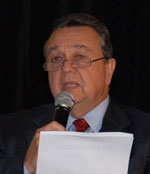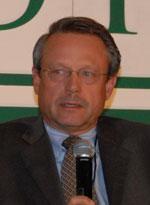Panel discussions at the World Food Prize Norman Borlaug Symposium in Des Moines are called “conversations” and one on Wednesday focused on the “Promises and Challenges of Next-Generation Science and Technology.”
 Among the presenters was Brazil’s former minister of agriculture Roberto Rodrigues, co-chair of the International Biofuels Commission who made a very compelling case that both food and fuel production can co-exist peacefully in other countries as they do in Brazil.
Among the presenters was Brazil’s former minister of agriculture Roberto Rodrigues, co-chair of the International Biofuels Commission who made a very compelling case that both food and fuel production can co-exist peacefully in other countries as they do in Brazil.
“Absolutely we are going to improve new technologies and we are able to feed humankind and produce biofuels all together,” Roberto said, adding that it is a “myth” that production of sugarcane for ethanol is reducing the production of food in Brazil. “This year we have a record grain production, but we also have record sugarcane production, record meat production and record production of dairy products -so there is no competition between sugarcane and food in Brazil and we can apply that in African, other Latin American and Asian countries.”
Listen to Roberto’s comments here:
wfp-08-roberto.MP3
You can also download the audio with this link: Roberto Rodrigues remarks at World Food Prize (mp3)
 Another speaker on the same panel was Pioneer Hi-Bred International president Paul Schickler who talked about all the improvements in seed technology and how it has increased production. He took the first question to the panel, which was “How optimistic are you that the world can reduce hunger by half by 2015?”
Another speaker on the same panel was Pioneer Hi-Bred International president Paul Schickler who talked about all the improvements in seed technology and how it has increased production. He took the first question to the panel, which was “How optimistic are you that the world can reduce hunger by half by 2015?”
Schickler stated that he was very confident that goal could be reached, simply on the basis of increased food production, using hybrid corn as an example. “If you look back throughout the development of hybrid corn, productivity has improved at about one and a half percent per year,” he said. “As we look to the future, we think we can double that, and that has already started to show up in the last 8-10 years through the use of biotechnology, plant genetics and improved agronomic practices.” That would mean corn yields in the United States could hit 210 bushels an acre in ten years, and what that means is increased sustainability because more food can be produced on less acreage.
Listen to Paul’s answer to that question here:
wfp-08-schickler.MP3
You can also download the audio with this link: Paul Schickler at World Food Prize (mp3)

